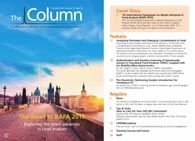7th International Symposium on Recent Advances in Food Analysis (RAFA 2015)
The 7th International Symposium on Recent Advances in Food Analysis (RAFA 2015) will take place at the Clarion Congress Hotel, Prague, Czech Republic, on 3–6 November 2015.
The 7th International Symposium on Recent Advances in Food Analysis (RAFA 2015) will take place at the Clarion Congress Hotel, Prague, Czech Republic, on 3–6 November 2015.
(Photo Credit: Andrea Zanchi/Getty Images)

The 7th International Symposium on Recent Advances in Food Analysis (RAFA 2015) will provide an overview of the current state-of-the-art on analytical and bioanalytical food quality, safety control strategies, and introduce the challenges and novel approaches in this field. The programme will be tailored to provide networking opportunities as well as exploring the latest results from the food analysis community. Presentations will be given by leading scientists through keynote lectures and contributed oral and poster presentations. The following areas will be covered:
- Food quality and safety: Allergens; industrial contaminants; metals and metalloids; mycotoxins; marine and plant toxins; packaging and processing contaminants; pesticide residues; and veterinary drug residues.
- General food analysis issues: Authentication and fraud; bioactivity measurements; flavour and sensory analysis; foodomics; food forensics; nanoparticles; novel food and supplements; organic crops and foodstuffs; QA/QC; micro- and nanoâfood sensors; chemometrics; and data interpretation.
The conference programme will also be accompanied by several satellite events including:
- â¨Workshops on novel analytical strategies: The 3rd European workshop on “Ambient mass spectrometry in food and natural products”; workshop on “Infrared and Raman spectroscopy, and chemometrics for monitoring of food and feed products, bringing the labâtoâtheâsample”; 1st European workshop on the “Analysis of nanoparticles in food, cosmetics, and consumer products”; workshop on “The application of micro/nano systems in food safety control”; and a workshop on “Smart data sets processing in food analysis”.
- Interactive seminar: This interactive seminar will be on the topic of “Sampleâprep, separation techniques, and mass spectrometric detection in food quality and safety: step-by-step strategies for fast development of smart analytical methods”.
- Food Authorities’ summit, EU and beyond: An FAO/IAEA workshop: Food safety - challenges for developing countries; an United States Department of Agriculture (USDA) seminar on “Food safety issues beyond the EU”.
- â¨Reference laboratories colloquium: A workshop on “Experiences, achievements, and challenges of EU Reference Laboratories”.
- EU Framework programme seminar: Tutorial for newcomers in HORIZON 2020, the EU framework Programme for Research and Innovation: a discussion platform mediating networking and joint planning of projects within the Societal challenge “Food security, sustainable agriculture, and forestry, marine, and maritime and inland water research and the bioeconomy” (chaired by an EC representative and supported by the Czech National Contact Point).
The keynote speakers have been announced and will include: Paul Brereton (Fera Science Ltd., York, United Kingdom) on “Food Fraud - Old Problems New Solution”; Christopher Elliott (Queen’s University Belfast, Belfast, UK) on “Elliott Review into the Integrity and Assurance of Food Supply Networks - Final Report, A National Food Crime Prevention Framework”; Carsten FauhlâHassek (Federal Institute for Risk Assessment, Berlin, Germany) on “Food Authentication: Challenges in Official Control”; Jana Hajslova (University of Chemistry and Technology, Prague, Czech Republic) on “Pleasures Offered by IonâMobility MS to Food Chemists”; Thomas Hofmann (Technische Universität München, München, Germany) on “Taste from Mother Nature and Culinary Art - Analytical Decoding by Means of the SENSOMICS Approach”; Christian Klampfl (Johannes Kepler University Linz, Linz, Austria) on “Ambient Ionization Mass Spectrometry: Ten Years after Introducing DART and DESI”; Jacob van Klaveren (National Institute for â¨Public Health and the Environment (RIVM), Bilthoven, The Netherlands) on “Exposure Assessment to Multiple Chemicals and Future Mixture Testing”; Rudolf Krska (University of Natural Resources and Life Sciences, Vienna, IFA-Tulln, Austria) on “How Does Climate Change Impact on the Occurrence and the Determination of Natural Toxins”; Erich Leitner (Graz University of Technology, Graz, Austria) on “Food Packaging Material and the Interaction with the Packed Good and the Analytical Challenges”; Luigi Mondello (University of Messina, Messina, Italy) on “Comprehensive Chromatography (GC×GC, LC×LC) Techniques Coupled to Mass Spectrometry for the Analysis of Food Samples”; Michel Nielen (RIKILT Wageningen UR, Wageningen, Netherlands) on “Ambient Mass Spectrometry Imaging of Food Contaminants”; John O’Brien (Nestlé Research Centre, Lausanne, Switzerland) on “Challenges and Opportunities in Food Analysis: Industry Perspective”; Petter Olsen (Nofima, Tromsoe, Norway) on “Fighting Food Fraud - When All You Have is a Hammer, Everything Looks Like a Nail”; Bert Popping (Mérieux NutriSciences Corporation, Tassin la DemiâLune, France) on “Out with the Old, In with the New: Novel Approaches in Allergen Detection Using MALDI-ToF-ToF and Mass Spectrometry”; Michael Rychlik (Technische Universität München, München, Germany) on “Complementary Approaches in Food omics Towards New Horizons in Food Analysis”; Michele Suman (Barilla Food Research Labs, Parma, Italy) on “Summary & Discussion Platform: Industry Perspectives”. An exhibition of recently introduced instrumentation in food analysis and other valuable equipment will be available during the symposium. Vendor seminars will also be organized to introduce recent developments and scientific strategies for advanced food quality and safety control.
Young scientists
are encouraged to present their scientific work. The prestigious RAFA Poster Award will be given for the best poster presentation by a young scientist, along with other sponsored poster awards.

Analytical Challenges in Measuring Migration from Food Contact Materials
November 2nd 2015Food contact materials contain low molecular weight additives and processing aids which can migrate into foods leading to trace levels of contamination. Food safety is ensured through regulations, comprising compositional controls and migration limits, which present a significant analytical challenge to the food industry to ensure compliance and demonstrate due diligence. Of the various analytical approaches, LC-MS/MS has proved to be an essential tool in monitoring migration of target compounds into foods, and more sophisticated approaches such as LC-high resolution MS (Orbitrap) are being increasingly used for untargeted analysis to monitor non-intentionally added substances. This podcast will provide an overview to this area, illustrated with various applications showing current approaches being employed.








